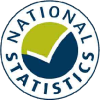Higher Education Student Statistics: UK, 2018/19 - Qualifications achieved
- Summary
- Student numbers and characteristics
- Where students come from and go to study
- Subjects studied
- Qualifications achieved
- Notes
How many HE qualifications were achieved?
The total number of qualifications achieved in 2018/19 was 801,135. This was an increase of 3% in the number of qualifications achieved in comparison to 2017/18, largely attributed to the increase at masters taught level. This follows the increased uptake of students onto masters taught courses in 2016/17 and 2017/18 following the introduction of postgraduate loans. The number of first degree qualifications awarded also increased, but there were fewer other undergraduate qualifications awarded. In the context of the European Union, statistics published by Eurostat in December 2019 reported the UK to have the largest number of qualifiers in 2017.
A qualifier is a student who gained a qualification during the academic year in question. This is useful for restricting data to a cohort of graduates. See the qualifications obtained population definitions for more detail.
Figure 15 - HE qualifications obtained by level of qualification
Academic years 2014/15 to 2018/19
Show:
Reset filters | Download table (csv) | Download source data (csv) | About SB255 Figure 15 | Notes
The total number of qualifications achieved in 2018/19 from undergraduate designated courses at APs was 16,725. This was an increase of 6% in the number of qualifications achieved from designated undergraduate courses in 2017/18. The number of qualifications achieved at all levels of undergraduate study increased between 2017/18 and 2018/19. For postgraduate courses, there has been a 1,745 increase in masters taught qualifications obtained from 2017/18 to 2018/19.
- In 2018/19, first degree qualifications accounted for 45% of undergraduate HE qualifications obtained on designated courses at APs.
- Between 2017/18 and 2018/19, the largest increase in undergraduate qualifications was amongst other undergraduates, at 440.
- There was a 40% increase in other postgraduate taught full-time qualifications achieved between 2017/18 and 2018/19.
- Female students accounted for 62% of masters taught qualifications received in 2018/19.
Figure 15a - Alternative provider qualifications obtained by level of qualification obtained
Academic years 2015/16 to 2018/19
Show:
Reset filters | Download table (csv) | Download source data (csv) | About SB255 Figure 15a | Notes
Of those gaining a classified first degree:
- The percentage of students achieving a first class honours remains stable at 28% for both 2017/18 and 2018/19. This follows an increase year on year since 2009/10 where 14% of students achieved this classification.
- A larger proportion of female students gained a first or upper second class honours than male students.
- Full-time students had a larger proportion of first or upper second class honours than part-time students.
There were 22,035 students who qualified with an unclassified first degree in 2018/19. This mainly includes degrees that don't have a classification, such as medicine. These students are excluded from Figure 16 but included in the total number of first degree qualifiers in Figure 15.
Figure 16 - Percentage of first degree qualifiers obtaining each classification
Academic years 2014/15 to 2018/19
Reset filters | Download chart data (csv) | Download source data (csv) | About SB255 Figure 16 | Notes
Of those gaining a classified first degree at APs:
- The percentage of students achieving a first or upper second class honours qualification has increased two percentage points to 60% over the period 2017/18 to 2018/19. The equivalent combined percentage for publicly funded HE providers is 77%, an increase of one percentage point on 2017/18.
- A larger proportion of female students gained a first or upper second class honours than male students.
There were 260 students who qualified from a designated course with an unclassified first degree in 2018/19. These students are excluded from Figure 16a but included in the total number of first degree qualifiers in Figure 15a.
Figure 16a - Percentage of first degree qualifications obtained on designated courses obtaining each classification
Academic years 2015/16 to 2018/19
Reset filters | Download chart data (csv) | Download source data (csv) | About SB255 Figure 16a
Figure 17 shows that in 2018/19:
- More qualifications were awarded in business & administrative studies than any other subject area.
- Amongst part-time students, more qualifications were awarded in subjects allied to medicine than any other subject area.
Over the five year period 2014/15 - 2018/19:
- There has been an overall increase in the number of qualifications gained in biological sciences and social studies.
- There has been a decline in the number of qualifications gained in languages and education.
Figures in subject tables are Full Person Equivalent (FPE). If a student on a course (an 'instance') studies more than one subject we apportion that instance between those subjects. For example, a student studying ⅔ Business studies and ⅓ French will be counted as 0.67 FPE in Business & administrative studies and 0.33 FPE in Languages.
Figure 17 - HE qualifications obtained by subject area and sex
Academic years 2014/15 to 2018/19
Show last:
Reset filters | Reset sort | Download table (csv) | Download source data (csv) | About SB255 Figure 17
Figure 17a shows that on designated courses in 2018/19:
- More qualifications were awarded in law than any other subject area, 69% of these qualifications were at postgraduate level.
- Among undergraduates, business & administrative studies saw more qualifications received than any other subject.
- Science subject areas accounted for 9% of qualifications awarded.
Figure 17a - Alternative provider qualifications obtained on designated courses by subject area and sex
Academic years 2015/16 to 2018/19
Reset filters | Download table (csv) | Download source data (csv) | About SB255 Figure 17a
- The percentage of qualifiers who gained qualifications in science subjects increased according to age group.
- A larger proportion of male students qualified in science subject areas than female, particularly at undergraduate level.
Figure 18 - Percentage of HE student qualifications obtained in science subject areas by personal characteristics
Academic years 2014/15 to 2018/19
Reset filters | Download table (csv) | Download source data (csv) | About SB255 Figure 18 | Notes

Release date
16 January 2020, 9:30
29 January 2020, 9:30
Coverage
UK
Release frequency
Annual - view all releases (1998/99 onwards)
Themes
Children, education and skills
Issued by
HESA, 95 Promenade, Cheltenham, GL50 1HZ
Press enquiries
+44 (0) 1242 211 120, [email protected]
Public enquiries
+44 (0) 1242 211 494, [email protected]
Statistician
Rebecca Mantle
Pre-release access
Pre-release access list for 16 January 2020 release
Pre-release access list for 29 January 2020 supplement





